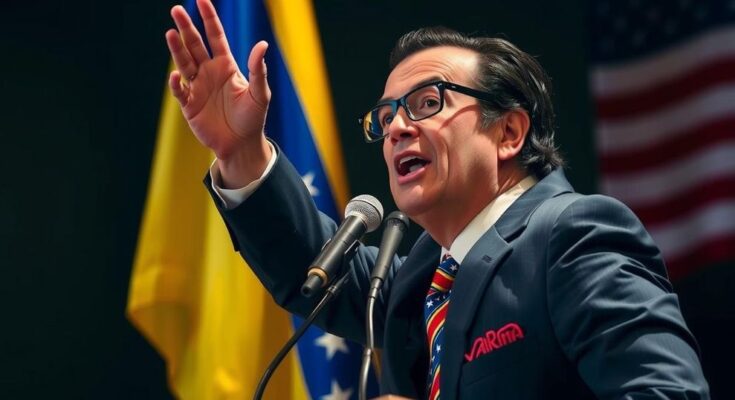The United States has recognized opposition leader Edmundo Gonzalez as Venezuela’s president-elect following the disputed July 28 election. Secretary of State Antony Blinken made this announcement at the G20 summit, marking a significant shift in U.S. policy. Gonzalez expressed gratitude for the acknowledgment, contrasting sharply with foreign minister Yvan Gil’s criticisms. This development highlights rising international backing for the Venezuelan opposition amid longstanding allegations of electoral fraud against incumbent Maduro.
The United States has officially recognized Edmundo Gonzalez, the leader of the Venezuelan opposition, as the president-elect of Venezuela, following a controversial presidential election held on July 28. This announcement, made by Secretary of State Antony Blinken via social media while attending the G20 summit in Rio de Janeiro, reflects a notable shift in U.S. policy regarding Venezuela. Previously, although many nations and organizations acknowledged Gonzalez had garnered more votes than the incumbent, Nicolas Maduro, they refrained from designating him as president-elect.
In his declaration, Secretary Blinken emphasized the importance of respecting the democratic will of the Venezuelan populace, stating, “The Venezuelan people spoke resoundingly on July 28 and made Edmundo Gonzalez the president-elect. Democracy demands respect for the will of the voters.” A spokesperson from the U.S. State Department further confirmed this recognition, asserting that international bodies recognized Gonzalez’s electoral victory, highlighting a greater demand for democratic change within the nation.
In response to the recognition, Gonzalez expressed his gratitude, stating, “We deeply appreciate the recognition of the sovereign will of all Venezuelans. This gesture honors our people’s desire for change and the civic feat that we carried out together on July 28.” Conversely, Venezuelan Foreign Minister Yvan Gil criticized the U.S. move, labeling Blinken as a “self-confessed enemy of Venezuela” and insinuating that the declaration borders on absurdity.
The backdrop of this political development includes allegations of electoral fraud in favor of Maduro, who was declared the winner by Venezuelan authorities amidst severe criticisms. Opposition groups assert that their collected vote tallies indicate a substantial victory for Gonzalez, who has since fled to Spain for safety reasons but aims to return for the presidential inauguration set for January 10.
The political situation in Venezuela has been tumultuous, particularly following the deeply contested presidential elections held on July 28, where Edmundo Gonzalez emerged as the opposition candidate. Despite being declared the winner by international observers, domestic electoral authorities announced Nicolas Maduro’s victory, stirring controversy and allegations of vote manipulation. The recent U.S. response signifies a pivotal moment in external relations with Venezuela, and marks a transition towards a firmer endorsement of democratically elected opposition leaders. This acknowledgment by the United States indicates a growing international recognition of the demand for democratic changes within Venezuela, following years of political strife and economic hardship under Maduro’s regime.
The U.S. recognition of Edmundo Gonzalez as president-elect of Venezuela is a significant development in the ongoing political landscape. This move reflects a commitment to uphold democratic values and respond to the Venezuelan electorate’s desire for change. The contrasting responses from the Venezuelan government and opposition leaders underline the complexity of the situation, emphasizing the challenges faced by Gonzalez as he plans to return to Venezuela amid his claims of electoral victory and ongoing unrest.
Original Source: edition.cnn.com




